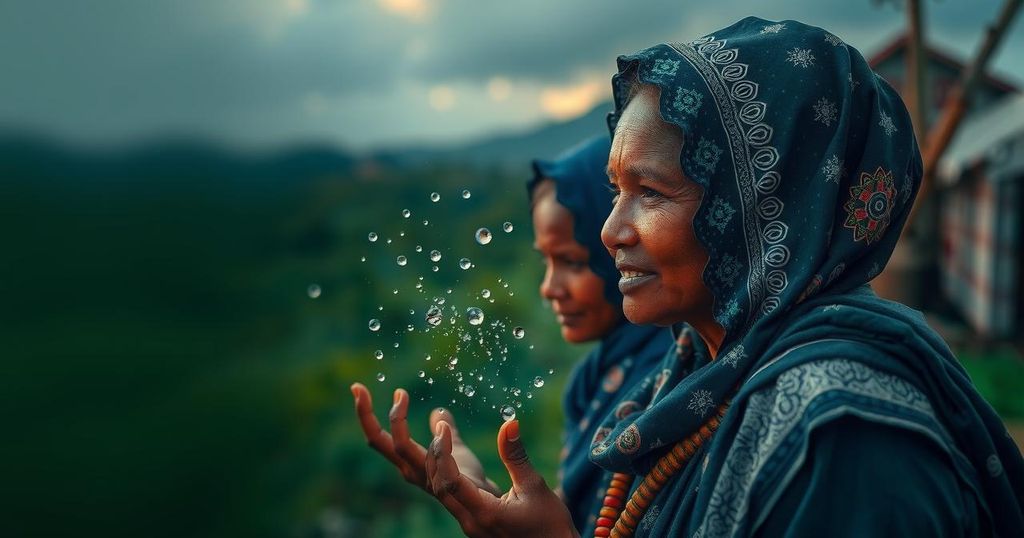80% of Climate Change Victims Are Women and Children, Says Nigerian Minister

During the UNCCD COP16, Minister Imaan Sulaiman-Ibrahim revealed that 80 percent of climate change victims are women and children. She advocated for targeted interventions to empower these groups and highlighted women’s significant roles in food systems and agriculture. The Minister called for investments to address the socio-economic challenges posed by climate change, emphasizing the need for women’s participation in sustainable practices and climate action.
Imaan Sulaiman-Ibrahim, Minister of Women Affairs, has reported that 80 percent of climate change victims globally are women and children, highlighting the urgent need for targeted interventions. Speaking at the United Nations Convention to Combat Desertification (UNCCD) COP16 in Riyadh, Saudi Arabia, she advocated for enhanced investments in women and children to mitigate the adverse impacts of climate change upon these vulnerable demographics.
The Minister emphasized that women play a crucial role in global food systems, accounting for 70 percent of food processing and 60 percent of smallholder farmers worldwide. She pointed out, “Given their significant contributions, empowering women to participate in land restoration and sustainable practices is essential.” She also addressed health risks posed by traditional cooking methods, warning that using wood or charcoal exposes women to inhaling smoke equivalent to 40 cigarette sticks per meal.
With Nigerian women comprising over 50 percent of the population and responsible for 70 percent of agricultural activities, Sulaiman-Ibrahim asserted their pivotal role in the green economy. She discussed the socio-economic ramifications of land degradation, particularly in the Northeast, where climate change-related conflicts displace millions and heighten risks of gender-based violence, forced marriages, and educational disruptions.
In the Northwest, desertification threatens agriculture and water resources, while the Niger Delta faces challenges from rising sea levels and flooding. The Southeast continues to endure gully erosion, causing significant economic losses. The Minister commended the Nigerian government for recent climate initiatives, including the Climate Change Act, the establishment of the National Council on Climate Change, and Nigeria’s Nationally Determined Contributions (NDC) Implementation Framework for 2023–2030.
Furthermore, she underscored the significance of the Climate Gender Policy in enhancing women’s roles in climate action, stating, “Empowering women to participate in climate action catalyzes innovative solutions and builds community resilience.” She urged international organizations and development partners to empower women with the necessary tools to implement sustainable solutions for climate change, emphasizing that women must lead the charge to achieve the relevant Sustainable Development Goals.
The UNCCD COP16 serves as a platform for global leaders to confront pressing environmental issues, with Nigeria’s active participation underscoring its commitment to fighting desertification and fostering inclusive climate action.
The impact of climate change disproportionately affects women and children, as evidenced by the Minister’s assertion that 80 percent of climate change victims belong to these groups. This statement highlights an urgent call for interventions that focus on the unique challenges faced by these vulnerable populations. The role of women in food systems and agriculture is also pivotal, given their contributions to food processing and farming, which positions them crucially in efforts towards sustainable practices and resilience building against climate impacts.
The Minister’s address at UNCCD COP16 emphasizes the urgency to prioritize women’s empowerment in climate action, affirming that addressing gender disparities is critical for effective responses to climate change. By recognizing the significant contributions of women to food security and sustainability, along with the substantial risks they face due to environmental degradation, the call for strategic investments and support is crucial. An inclusive approach that places women at the forefront of climate solutions is essential to achieve broader Sustainable Development Goals.
Original Source: businessday.ng






